Welcome
Fall is in the air, and we have many things to share with you. These include a report from the forum on speech-to-text and scribing that was held as a presession to the National Conference on Student Assessment. Several other NCEO reports are highlighted as well, including one on a literature review on measuring ELP progress of ELs with disabilities and ELs, one on publicly reported assessment results, and three on state assessment participation, performance, and accommodations data. Finally, this issue provides information on a new resource that is coming soon from NCEO’s TIES Center, an Impact issue on inclusive education for K-8 students with the most significant cognitive disabilities.
– Martha Thurlow, NCEO Director
Forum on Speech-to-Text for Everyone on All Tests
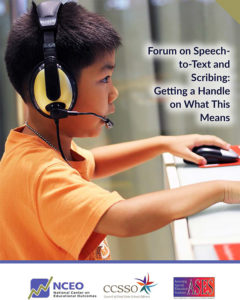 There is a need to develop greater clarity on the implementation of speech-to-text and scribing during instruction and assessment. On June 26, 2018 NCEO and the Council of Chief State School Officers’ (CCSSO) Assessing Special Education Students (ASES) State Collaborative on Assessments and Student Standards (SCASS) held a joint forum on issues surrounding the use of speech-to-text. The purpose of the pre-session was to discuss current and emerging issues with the use of speech-to-text for all students.
There is a need to develop greater clarity on the implementation of speech-to-text and scribing during instruction and assessment. On June 26, 2018 NCEO and the Council of Chief State School Officers’ (CCSSO) Assessing Special Education Students (ASES) State Collaborative on Assessments and Student Standards (SCASS) held a joint forum on issues surrounding the use of speech-to-text. The purpose of the pre-session was to discuss current and emerging issues with the use of speech-to-text for all students.
A Review of the Literature on Measuring English Language Proficiency Progress of English Learners with Disabilities and English Learners
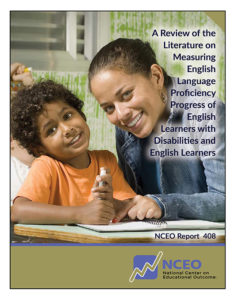 A new literature review published by NCEO examines evidence-based practices used (or recommended for use) to measure progress of English learners (ELs) with disabilities on English language proficiency (ELP) assessments. The report discusses how studies have defined ELP progress and the extent to which studies have examined ELP progress for ELs with disabilities.
A new literature review published by NCEO examines evidence-based practices used (or recommended for use) to measure progress of English learners (ELs) with disabilities on English language proficiency (ELP) assessments. The report discusses how studies have defined ELP progress and the extent to which studies have examined ELP progress for ELs with disabilities.
NCEO Reports: 2015-16 Publicly Reported Assessment Results for Students with Disabilities and ELs with Disabilities
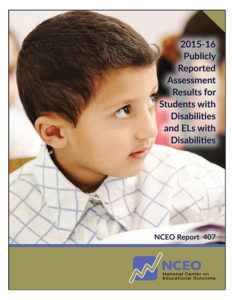 The NCEO report, 2015-16 Publicly Reported Assessment Results for Students with Disabilities and ELs with Disabilities, is the 19th report by the National Center on Educational Outcomes (NCEO) describing how states publicly report online assessment data for students with disabilities in K-12 schools in the United States.
The NCEO report, 2015-16 Publicly Reported Assessment Results for Students with Disabilities and ELs with Disabilities, is the 19th report by the National Center on Educational Outcomes (NCEO) describing how states publicly report online assessment data for students with disabilities in K-12 schools in the United States.
New APR Snapshot Reports
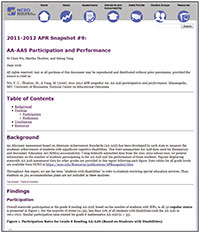 Three new briefs in the APR Snapshot series provide a quick look at the participation and performance of students receiving special education services in statewide assessments used for Elementary and Secondary Education Act (ESEA) accountability. These new briefs use federally submitted data from the 2015-16 school year.
Three new briefs in the APR Snapshot series provide a quick look at the participation and performance of students receiving special education services in statewide assessments used for Elementary and Secondary Education Act (ESEA) accountability. These new briefs use federally submitted data from the 2015-16 school year.
New Resource Arriving Soon on Supporting Inclusive Education
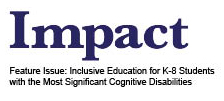 Staff of the National Center on Educational Outcomes (NCEO) and its TIES Center are guest editors for the upcoming publication, Impact: Feature Issue on Inclusive Education for K-8 Students with the Most Significant Cognitive Disabilities. Scheduled for release in late fall, this publication from the Institute on Community Integration (ICI), University of Minnesota, shares strategies, research, personal stories, and resources supporting inclusive education in our schools.
Staff of the National Center on Educational Outcomes (NCEO) and its TIES Center are guest editors for the upcoming publication, Impact: Feature Issue on Inclusive Education for K-8 Students with the Most Significant Cognitive Disabilities. Scheduled for release in late fall, this publication from the Institute on Community Integration (ICI), University of Minnesota, shares strategies, research, personal stories, and resources supporting inclusive education in our schools.
NCEO’s National Assessment Center is supported through a Cooperative Agreement (#H326G160001) with the Research to Practice Division, Office of Special Education Programs, U.S. Department of Education. The Center is affiliated with the Institute on Community Integration at the College of Education and Human Development, University of Minnesota. The contents of this report were developed under the Cooperative Agreement from the U.S. Department of Education, but do not necessarily represent the policy or opinions of the U.S. Department of Education or Office within it. Readers should not assume endorsement by the federal government.
Project Officer: David Egnor


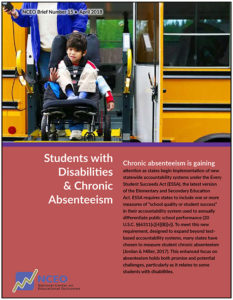
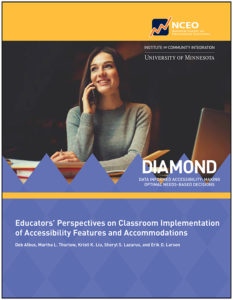
 NCEO recently added a new webpage to its information on state policies. The new page provides information on those states that have selected an assessment-related State-Identified Measureable Result (SIMR) as part of their State Systemic Improvement Plan (SSIP). The Office of Special Education Programs (OSEP)-required SSIP is a comprehensive multi-year plan that states develop and report on annually to improve results for children with disabilities.
NCEO recently added a new webpage to its information on state policies. The new page provides information on those states that have selected an assessment-related State-Identified Measureable Result (SIMR) as part of their State Systemic Improvement Plan (SSIP). The Office of Special Education Programs (OSEP)-required SSIP is a comprehensive multi-year plan that states develop and report on annually to improve results for children with disabilities.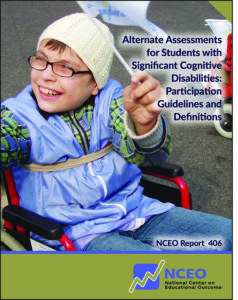
 NCEO’s DIAMOND project, a collaboration of nine states, is entering its final year. The project is an Enhanced Assessment Grant awarded to the Minnesota Department of Education. The project has completed (or is close to completing) activities designed to provide information for the development of learning modules to support educators’ understanding of accessibility features and accommodations, and how to make good decisions about them.
NCEO’s DIAMOND project, a collaboration of nine states, is entering its final year. The project is an Enhanced Assessment Grant awarded to the Minnesota Department of Education. The project has completed (or is close to completing) activities designed to provide information for the development of learning modules to support educators’ understanding of accessibility features and accommodations, and how to make good decisions about them. The 2018 conferences of the American Educational Research Association (AERA) and the National Council on Measurement in Education (NCME) are great forums for researchers and policymakers. The 2018 conferences, which are held at approximately the same time and in the same location, are being held in New York City on April 13-17. NCEO staff members will participate in both meetings.
The 2018 conferences of the American Educational Research Association (AERA) and the National Council on Measurement in Education (NCME) are great forums for researchers and policymakers. The 2018 conferences, which are held at approximately the same time and in the same location, are being held in New York City on April 13-17. NCEO staff members will participate in both meetings.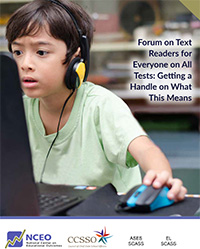 Text readers are now available in many states for all students. On June 27, 2017 NCEO, the Assessing Special Education Students (ASES) State Collaborative on Assessments and Student Standards (SCASS), and the English Learners (EL) SCASS held a joint forum on issues surrounding the use of text readers on tests. This a report on the discussions about availability of text readers for everyone on all tests, the differences in terminology for text readers, ways to develop common language around text readers, and challenges associated with text readers.
Text readers are now available in many states for all students. On June 27, 2017 NCEO, the Assessing Special Education Students (ASES) State Collaborative on Assessments and Student Standards (SCASS), and the English Learners (EL) SCASS held a joint forum on issues surrounding the use of text readers on tests. This a report on the discussions about availability of text readers for everyone on all tests, the differences in terminology for text readers, ways to develop common language around text readers, and challenges associated with text readers.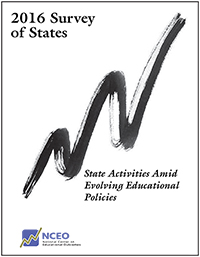 NCEO has published its 2016 state survey report, titled 2016 Survey of States: State Activities Amid Evolving Educational Policies. This report presents the results of the 15th survey of states by NCEO. The purpose of the report is to provide a snapshot of the new initiatives, trends, accomplishments, and emerging issues in states during a period of new education laws and initiatives.
NCEO has published its 2016 state survey report, titled 2016 Survey of States: State Activities Amid Evolving Educational Policies. This report presents the results of the 15th survey of states by NCEO. The purpose of the report is to provide a snapshot of the new initiatives, trends, accomplishments, and emerging issues in states during a period of new education laws and initiatives.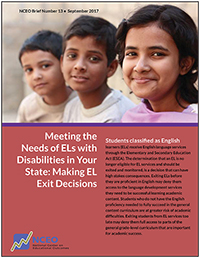 NCEO has published Meeting the Needs of ELs (English Learners) with Disabilities in Your State: Making EL Exit Decisions (NCEO Brief #13). This Brief summarizes key findings from a 2016 survey of Title III directors that asked about state policies and practices for exiting ELs with disabilities from EL services.
NCEO has published Meeting the Needs of ELs (English Learners) with Disabilities in Your State: Making EL Exit Decisions (NCEO Brief #13). This Brief summarizes key findings from a 2016 survey of Title III directors that asked about state policies and practices for exiting ELs with disabilities from EL services.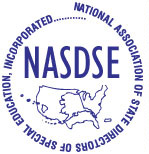 NCEO staff members, Martha Thurlow and Sheryl Lazarus, will lead two YOU PICKS discussion sessions at the annual meeting of the National Association of State Directors of Special Education (NASDSE). YOU PICKS sessions are designed to be interactive sessions where states have the opportunity to reflect, share, question, and so forth.
NCEO staff members, Martha Thurlow and Sheryl Lazarus, will lead two YOU PICKS discussion sessions at the annual meeting of the National Association of State Directors of Special Education (NASDSE). YOU PICKS sessions are designed to be interactive sessions where states have the opportunity to reflect, share, question, and so forth.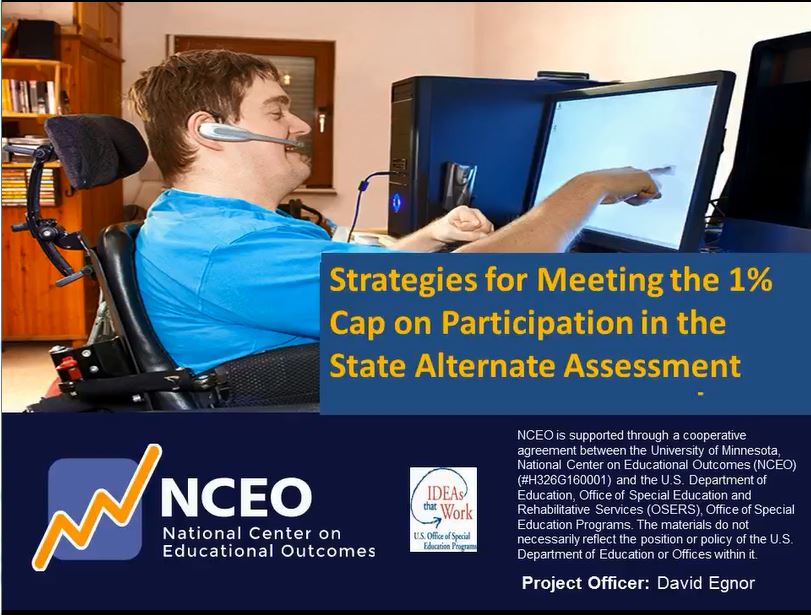 NCEO presented a webinar on April 27, 2017 on Strategies for Meeting the 1% Cap on Participation in the State Alternate Assessment, covering what the Every Student Succeeds Act (ESSA) says about the 1% cap on participation in the alternate assessment, the provisions in regulation for requesting a waiver from the 1% cap, and several strategies for meeting the 1% cap.
NCEO presented a webinar on April 27, 2017 on Strategies for Meeting the 1% Cap on Participation in the State Alternate Assessment, covering what the Every Student Succeeds Act (ESSA) says about the 1% cap on participation in the alternate assessment, the provisions in regulation for requesting a waiver from the 1% cap, and several strategies for meeting the 1% cap.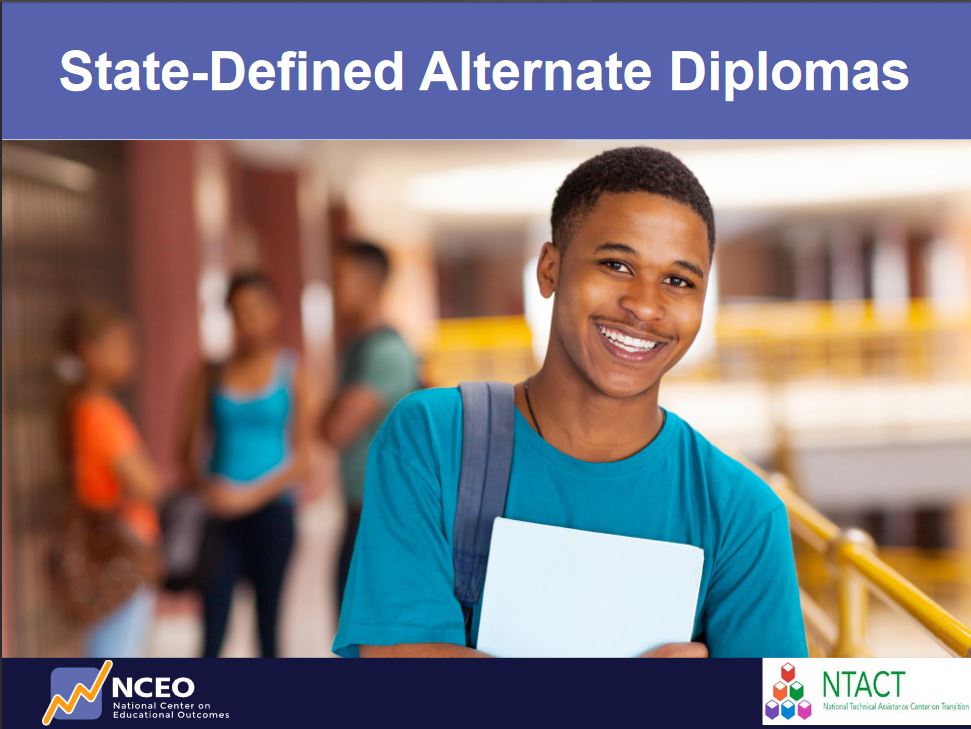 NCEO and the National Technical Assistance Center on Transition (NTACT) hosted a webinar on state-defined alternate diplomas for students with the most significant cognitive disabilities.
NCEO and the National Technical Assistance Center on Transition (NTACT) hosted a webinar on state-defined alternate diplomas for students with the most significant cognitive disabilities.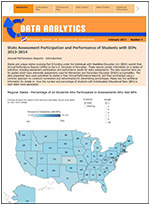 NCEO published the fifth Data Analytics report, State Assessment Participation and Performance of Students with IEPs, 2013-2014. The online interactive data report highlights the Annual Performance Report (APR) data for 2013-14 state-level assessment participation and performance results for students with IEPs.
NCEO published the fifth Data Analytics report, State Assessment Participation and Performance of Students with IEPs, 2013-2014. The online interactive data report highlights the Annual Performance Report (APR) data for 2013-14 state-level assessment participation and performance results for students with IEPs.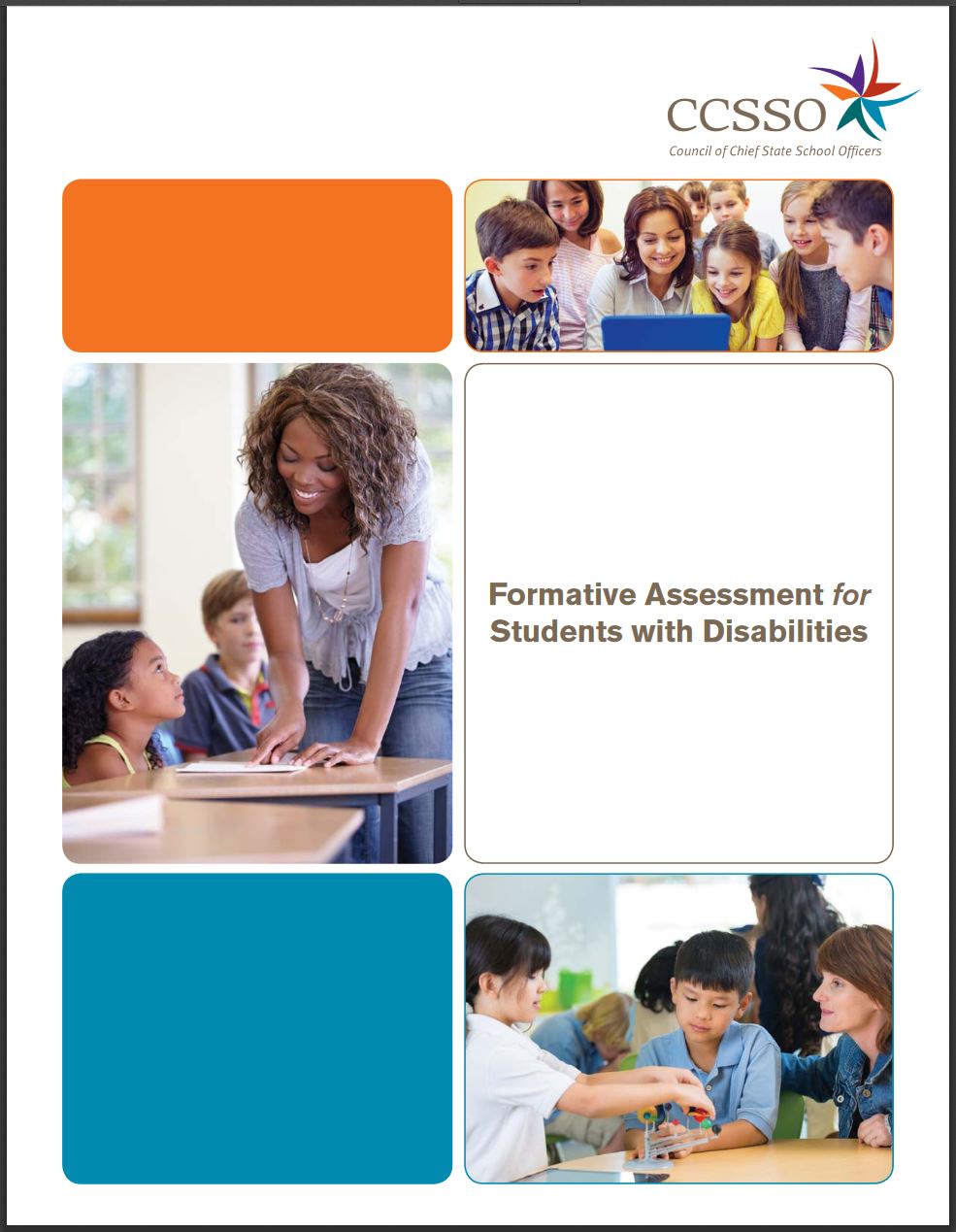 NCEO’s Sheryl Lazarus is the co-author of a resource, Formative Assessment for Students with Disabilities, that was recently published by the Council of Chief State School Officers (CCSSO). This report provides practical suggestions and information about how formative assessment can be used with all students, including students with disabilities.
NCEO’s Sheryl Lazarus is the co-author of a resource, Formative Assessment for Students with Disabilities, that was recently published by the Council of Chief State School Officers (CCSSO). This report provides practical suggestions and information about how formative assessment can be used with all students, including students with disabilities. Please join NCEO, the ASES SCASS, and the EL SCASS for a pre-session on June 27 at the National Conference on Student Assessment in Austin, Texas titled Text Readers for Everyone on All Tests – Getting a Handle on What This Means. This pre-session will bring together states, assessment vendors, and other educational stakeholders to address the need to develop clarity on the implementation of text readers.
Please join NCEO, the ASES SCASS, and the EL SCASS for a pre-session on June 27 at the National Conference on Student Assessment in Austin, Texas titled Text Readers for Everyone on All Tests – Getting a Handle on What This Means. This pre-session will bring together states, assessment vendors, and other educational stakeholders to address the need to develop clarity on the implementation of text readers.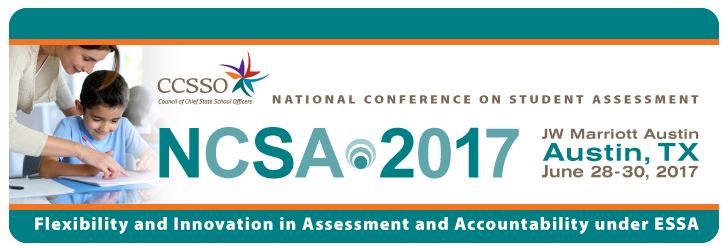 The 2017 National Conference on Student Assessment (NCSA) is the premiere forum for assessment practitioners to discuss what is happening in the real world of educational assessment—what is new, what is going on at the state and federal level, what works, and what does not. NCEO staff members will participate in several sessions.
The 2017 National Conference on Student Assessment (NCSA) is the premiere forum for assessment practitioners to discuss what is happening in the real world of educational assessment—what is new, what is going on at the state and federal level, what works, and what does not. NCEO staff members will participate in several sessions.